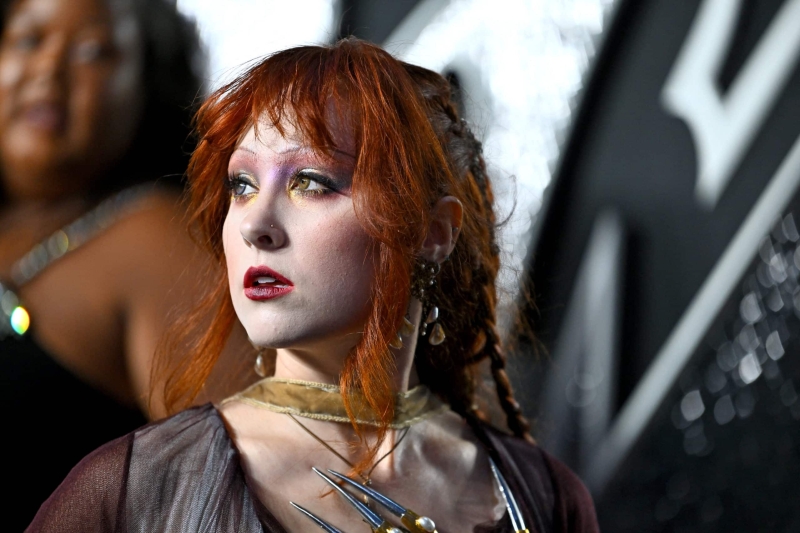Chappell Roan attends the 2024 MTV Video Music Awards at UBS Arena on September 11, 2024 in Elmont, New York. Image: Roy Rochlin/GETTY IMAGES NORTH AMERICA/Getty Images via AFP
Camp queen, queer icon, a searing yet irreverent songwriter with cascading vocals: Chappell Roan has soared to pop’s upper echelons on a singular blend of vulnerability and high-production performance that has earned her legions of fans.
On February 3, Monday (February 2, Sunday, in the US), Roan won the Grammy for Best New Artist, besting stiff competition including from fellow artists of the moment Sabrina Carpenter and Shaboozey.
The pop star’s supersonic ascent has made the musician from Missouri with a waterfall of red curls one of the leading contenders at the Grammy Awards with six nominations, including in all four major categories.
Her over-the-top theater kid persona, complete with wildly lavish costumes and high-drama makeup that nods to drag culture, made her an unstoppable force on the festival circuit.
And since then, the 26-year-old has been truly inescapable — on TikTok, the radio, streaming, late-night shows, and, eventually, a viral media cycle over her lukewarm support of presidential candidate Kamala Harris that proved, in case anyone doubted it, just how big she’d gotten.
In an industry thirsty for “moments,” it seemed like Roan was a rare bird who appeared out of nowhere.
But she’d actually been hustling for a decade — making music while working odd jobs, handling mental health struggles, and coming into her own.
Roan used her acceptance speech to put the recording industry on notice to treat struggling artists with more respect and offer better social protections.
“I told myself that if I ever won a Grammy and got to stand up here before the most powerful people in music, I would demand that labels in the industry profiting millions of dollars off of artists would offer a livable wage and health care, especially to developing artists,” she said to applause.
She recounted how difficult it was to be dropped by her label with “zero job experience,” and then to find a job as the coronavirus pandemic swept the nation.
“It was devastating to feel so committed to my art and feel so betrayed by the system and dehumanized,” she said. “Record labels need to treat their artists as valuable employees,” she said. “Labels, we got you, but do you got us?”
Midwest Princess
Born Kayleigh Rose Amstutz on February 19, 1998, in Willard, Missouri, Roan threw herself into the arts while never quite finding her social footing, and grappling with weighty emotions she would eventually learn were symptoms of bipolar disorder.
Her YouTube performances earned attention, and she moved to Los Angeles — but then home again after Atlantic Records dropped her amid the early days of the pandemic that left the music industry reeling.
But before she was cut loose, Roan dropped “Pink Pony Club,” a track that years later would blossom as one of her smash hits.
View this post on Instagram
Dan Nigro, the heavyweight producer who worked with Roan at Atlantic, reconnected with her in 2021, and the years-long build-up to her soaring takeoff began in earnest.
For several scrappy years, she worked odd jobs, amassed followers on TikTok, underwent therapy to treat her unpredictable condition and finished her debut album.
Roan — whose stage name pays homage to her late grandfather Dennis Chappell and his favorite song, “The Strawberry Roan” — released her bold, vulnerable album “The Rise and Fall of a Midwest Princess” in 2023 to critical praise.
On it, she delves into themes of sexuality and yearning with a pop-forward, dance-heavy beat and impressive vocals that one critic characterized as “singing in cursive.”
Her standalone single “Good Luck, Babe!” and the cheerleader-inspired dance number “Hot to Go!” found enormous audiences.
She thrived on TikTok but Roan wasn’t only magnetic online: it was her extravagant presence onstage — she did New York’s Governors Ball dressed as the Statue of Liberty after arriving in a huge apple bong — that cemented her superstar status.
Growing pains
Roan’s phenomenal rise has come with a price: she has spoken out about fame’s growing pains that have left her exhausted and at times afraid of aggressive fans.
During a set over the summer, she broke down in tears, telling fans she felt “a little off today” over her career’s breakneck pace.
She says many of her fellow artists have reached out with sympathy, including Elton John — who comically called her from an unidentified number 11 times before she answered and realized it was him, she told Rolling Stone.
View this post on Instagram
“I was telling him I was struggling a lot, and he said, ‘If you need to stop, say stop,’” she said.
Roan, who grew up in a conservative, Christian household, isn’t shy about speaking out on topics from trans rights to supporting the Palestinian cause but does not want to be pigeon-holed for her progressive politics.


